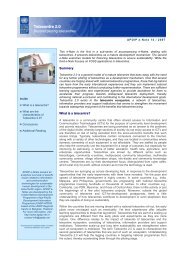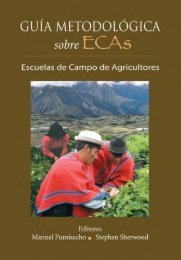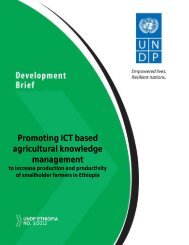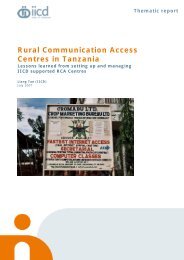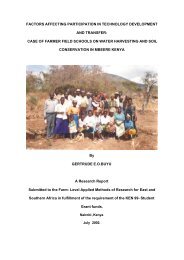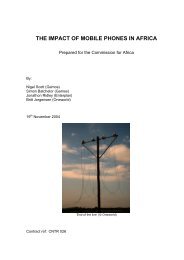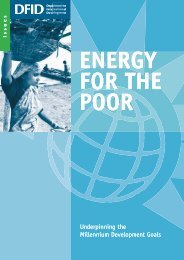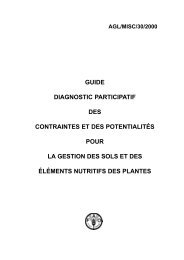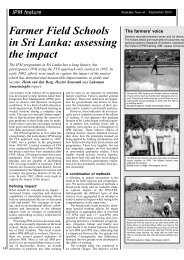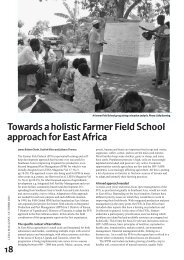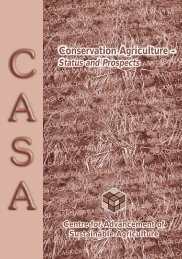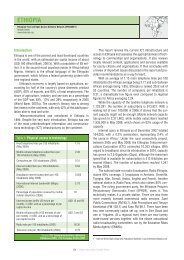inventory of farmer study group initiatives in africa - Share4Dev.info
inventory of farmer study group initiatives in africa - Share4Dev.info
inventory of farmer study group initiatives in africa - Share4Dev.info
Create successful ePaper yourself
Turn your PDF publications into a flip-book with our unique Google optimized e-Paper software.
Inventory <strong>of</strong> Farmer Study Group Initiatives <strong>in</strong> Africa – A Synthesis Report<br />
Arnoud R. Braun<br />
forum for Government policy makers from a wide range <strong>of</strong> African countries to<br />
share experiences on agricultural advisory services.<br />
While demand-driven extension is now widely believed to improve the<br />
effectiveness <strong>of</strong> conventional extension approaches it still rema<strong>in</strong>s unclear how<br />
demand-driven services can be put <strong>in</strong>to practice effectively (Neuchatel Group,<br />
2004). Further, as the system <strong>of</strong> extension changes, <strong>in</strong>creased attention is given<br />
to the question what k<strong>in</strong>d <strong>of</strong> services are <strong>in</strong> demand by <strong>farmer</strong>s. In addition,<br />
<strong>in</strong>creased knowledge about poor people’s livelihoods has shown that the poor<br />
draw on multiple strategies to secure a livelihood that go far beyond simply<br />
production (Farr<strong>in</strong>gton et al., 2002; Christoplos, 2003), and extension therefore<br />
needs to adjust accord<strong>in</strong>gly.<br />
To achieve agricultural and rural development new approaches to extension are<br />
needed that make better use <strong>of</strong> knowledge among <strong>farmer</strong>s, and provide them<br />
with a stronger voice to demand for advice and services, and negotiat<strong>in</strong>g power<br />
(Christoplos, 2003). Emergent questions are how poor, weak and vulnerable<br />
<strong>group</strong>s can be strengthened to experiment, enhance, share and spread their own<br />
knowledge and how they better can articulate their needs. This requires a shift<br />
from previous perceptions where <strong>farmer</strong>s were seen ma<strong>in</strong>ly as ‘adopters’ or<br />
‘rejecters’ <strong>of</strong> technologies but not as providers <strong>of</strong> knowledge and improved<br />
practices (Leeuwis, 2000). One <strong>of</strong> the ma<strong>in</strong> goals <strong>of</strong> demand-driven extension is<br />
to develop <strong>in</strong>dependent producer organisations that can articulate demands and<br />
negotiate for services. However, such organisations cannot be established from<br />
the outside, but have to grow from the ground though social mobilisation.<br />
Various programmes and <strong><strong>in</strong>itiatives</strong> <strong>in</strong> the region are <strong>in</strong>volved <strong>in</strong> <strong>farmer</strong> education<br />
<strong>in</strong> which various aspects <strong>of</strong> demand-driven extension are be<strong>in</strong>g applied. The<br />
concept <strong>of</strong> community participation is generally very well <strong>in</strong>corporated <strong>in</strong> such<br />
<strong><strong>in</strong>itiatives</strong>. However, participatory tools and methods are <strong>of</strong>ten limited to <strong>in</strong>itial<br />
community development activities, such as vision<strong>in</strong>g <strong>of</strong> goals, identification <strong>of</strong><br />
problems, opportunities and <strong>in</strong>tervention priorities. Actual tra<strong>in</strong><strong>in</strong>g and capacity<br />
build<strong>in</strong>g activities that follow are <strong>of</strong>ten done through conventional tra<strong>in</strong><strong>in</strong>g <strong>in</strong><br />
which an expert tra<strong>in</strong>s <strong>farmer</strong>s on the identified topics. There has not been a<br />
widespread recognition <strong>of</strong> problem-based, experiential learn<strong>in</strong>g techniques, nor<br />
has there generally been recognition for the fact that facilitat<strong>in</strong>g such type <strong>of</strong><br />
learn<strong>in</strong>g <strong>of</strong>ten requires very different set <strong>of</strong> skills by the field worker than the ones<br />
<strong>of</strong> the traditional extension worker. Even though agriculture is a good entry po<strong>in</strong>t<br />
for community development, it is imperative that extension provision broadens<br />
out to cover a larger spectrum <strong>of</strong> livelihood issues.<br />
Challenges and opportunities for FSGs<br />
Chang<strong>in</strong>g extension systems. Extension staff who long have been <strong>in</strong>volved <strong>in</strong><br />
T&V type <strong>of</strong> extension approaches tend to have a strong technical bias and even<br />
though participation is a common concept for most staff, they still <strong>of</strong>ten lack<br />
capacity to put participatory learn<strong>in</strong>g <strong>in</strong>to practice. This affects the level to which<br />
<strong>study</strong> <strong>group</strong> <strong><strong>in</strong>itiatives</strong> are demand-driven and <strong>farmer</strong>-centred. In FFS this is a<br />
21



